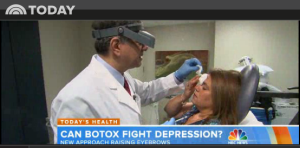Treating Depression with Botulinum Toxin: A Pooled Analysis of Randomized Controlled Trials
Abstract
Introduction: Botulinum toxin A (BTA) injection into the glabellar region is currently being studied as a treatment for major depressive disorder (MDD). Here we explore efficacy data of this novel approach in a pooled analysis.
Methods: A literature search revealed 3 RCTs on this topic. Individual patient data and clinical end points shared by these 3 trials were pooled and analyzed as one study (n=134) using multiple regression models with random effects.
Results: In the pooled sample, the BTA (n=59) and the placebo group (n=75) did not differ in the baseline variables. Efficacy outcomes revealed BTA superiority over placebo: Improvement in the Hamilton Depression Rating Scale or Montgomery-Asberg Depression Rating Scale 6 weeks after baseline was 45.7% for BTA vs. 14.6% for placebo (p<0.0001), corresponding to a BTA response rate of 54.2% (vs. 10.7%) and a BTA remission rate of 30.5% (vs. 6.7%).
Discussion: Equalling the status of a meta-analysis, this study increases evidence that a single treatment of BTA into the glabellar region can reduce symptoms of MDD. Further studies are needed to better understand how BTA exerts its mood-lifting effect. Read More…
 In the largest study to date on the effect of botulinum toxin on depression, researchers Eric Finzi, MD, PhD, and Norman E. Rosenthal, MD, found that 52% of subjects suffering from moderate to severe depression showed relief from depression after injection of botulinum toxin to the glabellar area between the eyes, compared with only 15% of those who received the saline placebo. The study, “Treatment of depression with onabotulinumtoxinA: A randomized, double-blind, placebo controlled trial” was published in Journal of Psychiatric Research, Volume 52 (May 2014). These findings help to confirm a novel concept for mental health – using facial expressions to influence thoughts and feelings.
In the largest study to date on the effect of botulinum toxin on depression, researchers Eric Finzi, MD, PhD, and Norman E. Rosenthal, MD, found that 52% of subjects suffering from moderate to severe depression showed relief from depression after injection of botulinum toxin to the glabellar area between the eyes, compared with only 15% of those who received the saline placebo. The study, “Treatment of depression with onabotulinumtoxinA: A randomized, double-blind, placebo controlled trial” was published in Journal of Psychiatric Research, Volume 52 (May 2014). These findings help to confirm a novel concept for mental health – using facial expressions to influence thoughts and feelings. 